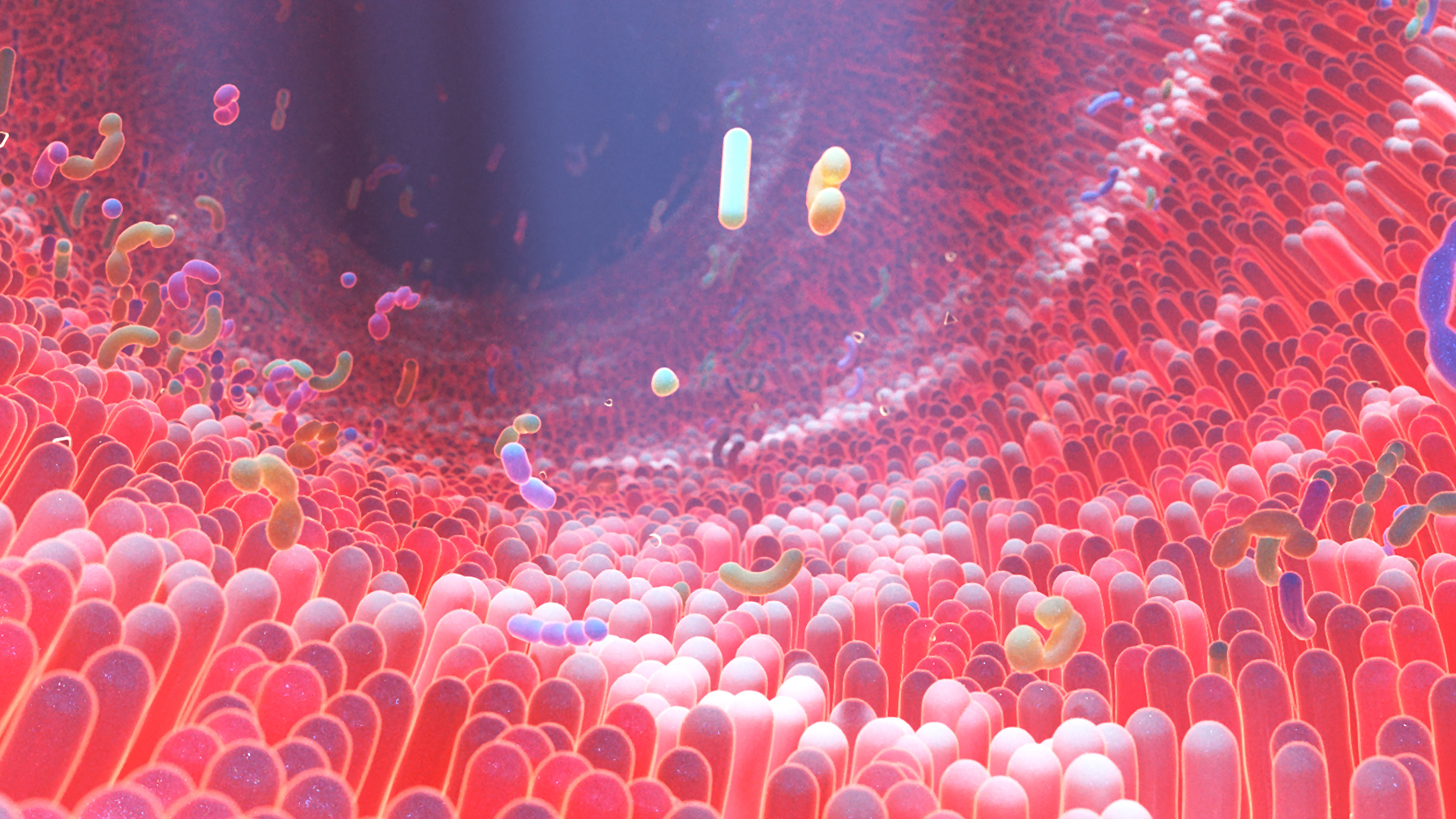Is there a link between gut health and weight loss?
The links between gut health and weight loss have been closely studied. Here’s what we know so far

Is there a link between gut health and weight loss? While we’ve long known that the key to losing weight is a consistent deficit in calories, the latest research shows that there may indeed be a connection between gut health and weight loss too. So could improving our digestive health help us to shed unwanted pounds?
A study published in the Gastroenterology journal suggests that the composition of our gut microbiome could predict how successful we are at achieving our goals. However, scientists are only just beginning to explore this novel gut-weight concept. And it’s not an easy task.
Our metabolism is a highly complex mechanism. If you’ve ever embarked on a weight loss journey, you may know that it’s not as straightforward as ‘energy in versus energy out’. How efficient our bodies are at using calories and regulating appetite will depend on a wide range of factors. Some of them cannot be changed, like our genetic make-up or age. But others, like our gut microbiota, can be modified.
If there is a connection between gut health and weight loss, this could open up new possibilities. For example, probiotics and prebiotics could be used in the fight against obesity. But how do these ideas stack up against science?
Here, we discuss what we know so far about the role of gut bacteria in weight management, and look into ways to improve our gut health. And if you want to give your gut bacteria a boost, make sure to check our guide to the best probiotic for useful tips and advice.
What is the gut-weight connection?
Gut hormones
The constant communication between our nervous and digestive systems is central to regulating our metabolism and appetite. Gut hormones play a critical role in this exchange of information, passing on signals of nutritional status from our gut to the brain, so the brain can interpret the body’s energy needs and respond to them accordingly.
Our gastrointestinal system releases over 20 different hormones involved in maintaining energy balance. The levels of these gut hormones depend on a number of factors, including the food we eat, the state of our health, and the compounds produced by the gut bacteria.

Some of these hormones will directly affect our eating behavior. According to the Journal of Obesity, cholecystokinin, peptide YY, pancreatic polypeptide, glucagon-like peptide-1, and oxyntomodulin will suppress your appetite, whereas ghrelin will make you more hungry.
Studies employing advanced neuroimaging techniques have shown how powerful these hormones are at changing our brain activity. Interestingly, one of the aims of a vertical sleeve gastrectomy — a procedure in which part of the stomach is removed to restrict the amount of food people can consume — is to impact this endocrine appetite control. According to the Annals of Surgery, this type of surgery leads to a marked decrease in the levels of hunger-boosting ghrelin.
Gut hormones are critical to weight loss. Low-calorie diets will inevitably alter their levels to promote appetite and a less efficient metabolism, as reported in the Hormone and Metabolic Research journal. That’s why so many people on weight loss diets may struggle with controlling their appetite and the dreaded yo-yo effect.
- Related: Is fiber good for weight loss?
Gut microbes and obesity
Is there a link between gut health and obesity? There’s growing evidence that people who carry excess weight tend to have a different composition of gut microbes compared with lean individuals. According to a review published in the Nutrients journal, gut microbiota of obese people may be less diverse and contain less of the beneficial bacterial strains.
However, the Genes & Nutrition journal reports that certain strains associated with obesity and metabolic disorders in Western populations may not have the same effect on Eastern populations. For example, Prevotella and Ruminococcus were obesity-associated genera in studies from the West — but lean-associated in the East. Roseburia and Bifidobacterium were lean-associated genera only in the East, whereas Lactobacillus was an obesity-associated strain in the West. Therefore it is unclear whether these differences are a cause or result of excess body weight. More studies are needed to fully understand this issue — and what it may mean for weight loss interventions.

There is also mixed evidence when it comes to using fecal transplants as a treatment for obesity, as stated in the Nutrients journal. Fecal microbiota transplantation (FMT) is a procedure in which fecal bacteria is transferred from one individual into another individual. The idea is that the lean person’s microbiota will help balance the microbiome of an obese person, triggering weight loss in the process. However, no significant changes in blood sugar levels, BMI or cholesterol were detected in those who underwent this procedure.
Nevertheless, studies have shown that certain microbial by-products tend to be consistently elevated in obese individuals. People carrying excess body weight tend to test more for metabolites like amino acids, lipids and lipid-like metabolites, bile acid derivatives, and other compounds which have been shown to increase the risk of insulin resistance, hyperglycemia, and dyslipidemia.
Gut microbes and weight loss
What does science say about gut health and weight loss interventions? According to a meta-analysis published in the Gut Microbes journal, losing weight tends to result in an increase in the diversity of gut microbes. It also favors the growth of more beneficial strains.
There is also evidence that your gut health may dictate how quickly you are able to shed unwanted pounds. As stated in the Gastroenterology journal, the baseline gut microbiota — the composition of gut microbes at the start of a weight loss program — may be one of the most important predictors of successful end results.
At the same time, researchers from The American Journal of Clinical Nutrition point out that gut microbes may be quite resistant to change. The scope of these changes may also depend on the type of a weight loss diet. For example, a study published in the Journal of Personalized Medicine points to the Mediterranean diet as potentially the most beneficial.

Physical activity may also change the composition of our gut bacteria. According to a review published in the Nutrition, Metabolism & Cardiovascular Diseases journal, exercise can promote the growth of the beneficial strains, while decreasing the obesity-related Proteobacteria.
So there is certainly a strong link between gut health and weight loss, but we still do not know what truly works, and what doesn’t. Having said this, we have a good understanding as to which individual foods can benefit our gut health — and taking care of our little intestinal residents can benefit our body nonetheless.
What are the best foods for gut health?
Foods rich in dietary fiber:
- Fruits
- Vegetables
- Wholegrains
- Beans
- Legumes
- Avocado
Foods rich in probiotics:
- Fermented dairy products, such as yogurt and kefir
- Fermented soya products, such as tempeh and natto
- Miso soup
- Sauerkraut
- Kimchi
- Kombucha
Foods rich in prebiotics:
- Garlic
- Onions
- Chicory root
- Chickpeas
- Artichokes
- Beans
- Leeks
- Bananas
- Oats
- Almonds
Do probiotics help with weight loss?
Can you take probiotics to lose weight? It is difficult to answer this question with certainty. The science exploring the links between probiotic supplementation and weight loss is still in its infancy.
It may largely depend on the type of bacterial strains used. According to a review published in the International Journal of Obesity, these include Lactobacillus plantarum, Lactobacillus rhamnosus, Lactobacillus curvatus, Lactobacillus gasseri, Lactobacillus amylovorus, Lactobacillus acidophilus and Lactobacillus casei. However, they may need to be combined with a low-calorie diet to bring about the best results. Scientists are also investigating the potential of lesser-known Akkermansia strains. As stated in a review published in the Archives of Physiology and Biochemistry, they may help manage obesity and associated metabolic complications.
This article is for informational purposes only and is not meant to offer medical advice.
Sign up for the Live Science daily newsletter now
Get the world’s most fascinating discoveries delivered straight to your inbox.

Anna Gora is a health writer at Live Science, having previously worked across Coach, Fit&Well, T3, TechRadar and Tom's Guide. She is a certified personal trainer, nutritionist and health coach with nearly 10 years of professional experience. Anna holds a Bachelor's degree in Nutrition from the Warsaw University of Life Sciences, a Master’s degree in Nutrition, Physical Activity & Public Health from the University of Bristol, as well as various health coaching certificates. She is passionate about empowering people to live a healthy lifestyle and promoting the benefits of a plant-based diet.










